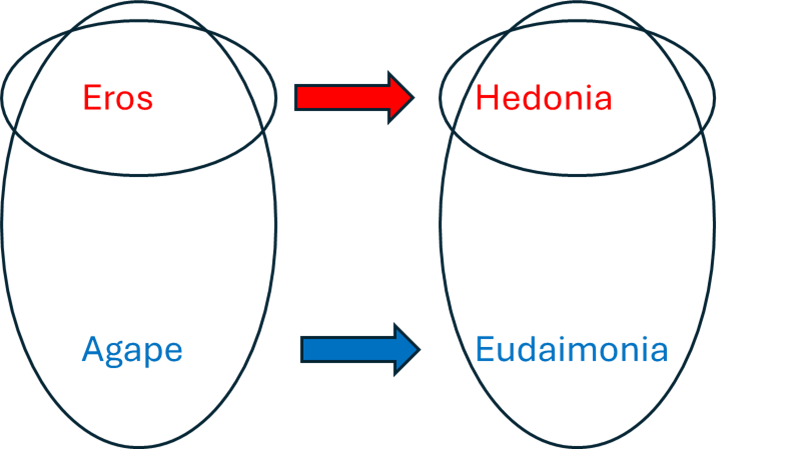TLW and I recently celebrated our 32nd wedding anniversary, and one of our daughters will be getting married in just a few weeks, so I have been thinking about love and what it means.
The Ancient Greeks had a number of words for the thing we call love. CS Lewis outlines four in his book, conveniently named The Four Loves. I haven’t read the book, but I have read some of the arguments. For me, I think two are enough to understand love, because the two I leave out collapse, more or less, into one of the two I recognize.
The two loves I think are useful for understanding a relationship are eros and agape. I leave out philia and storge because I think they collapse into agape (but I am open to discussion!).
Eros, the root of erotic, is romantic love. It is the feeling of being smitten, of being struck by an arrow or a lightning bolt - it is a thing that comes unbidden without choice or contemplation. And it is fickle, capable of fading away just as quickly as it comes. It is the falling into and falling out of love. All of the metaphors for eros are involuntary and passive. Falling is an accident. Falls happen to a person. One does not jump into erotic love (an active act), one falls (a passive act). It is a kind of madness we fall into, and we often wake up from, but when under its spell, we may do all sorts of foolish things which we may look back on with embarrassment or regret when the feeling passes.
Although we express eros as a form of love, it is really a self-love, and it maps onto self-centered happiness, hedonia. Eros is desire. It is the desire to possess the object of your love, and the desire to be desired by the object of your love. Thus, it is self-centered. A lover overcome by eros may seek to give her/his lover pleasure, but the purpose of this act is to get the lover to desire the giver more. It is all about the lover and not the loved. The fulfillment of eros is temporal pleasure, hedonia. It is the physical and emotional satisfaction of possession and being possessed.
Agape could be defined as charity, and fits the definition provided by Aristotle that I have shared before:
“Let loving (agape), then, be defined as wishing for anyone the things which we believe to be good, for his sake but not for our own, and procuring them for him as far as lies in our power.”
- Aristotle, Rhetoric
Agape is other-centered. It is finding happiness in another’s happiness. Agape maps onto eudaimonia, the happiness that comes from reflective well-being. In terms of love, it is the happiness that comes from helping another person complete their life’s work and purpose.
We can experience agape for our family members (parents, children, siblings) or friends. CS Lewis categorizes these loves as storge and philia respectively, but they are both loves that move us to help someone else live their best life, so for me, they are really just specific manifestations of agape.
Unlike eros, agape is a choice. In a long-term relationship, romantic or not, agape is a series of repeated choices to will good for another.
A lasting romantic relationship often starts with eros and then grows into agape. It is also possible to have agape first, and have eros strike. In a long-term romantic relationship, it is important to have both eros and agape, but eros is subordinated to and subsumed by agape. The dopamine hit of the erotic and the hedonic pleasure are meant to reinforce the charitable caring of agape. Choosing to engage eros, to invite it in, helps sustain the romantic relationship. While one can’t completely choose eros, one can create the conditions for it to strike.
As I think about my daughter and her future husband, I hope they are able to cultivate both eros and agape, because hedonia contributes to eudaimonia. Although eudaimonia is the mark of a life well-lived, hedonia contributes to that feeling.
I feel like 32 years gives me (and TLW) the right to say a couple of things about maintaining a pretty successful marriage. Perhaps the most important is this: the love that keeps a marriage going is more agape than eros. It’s the choosing to will the good of another that matters more than anything else. Eros is the frosting on the cake of romantic success - but it’s hard to feel eros about someone you despise. Agape is about choosing the Other over and over, day in, and day out, even when it is hard - and marriage is hard (especially when you are married to someone as difficult and selfish as I am - TLW is clearly due for sanctification at some point soon). Hedonia is fun, but eudaimonia is - literally by definition - what matters in the end.






